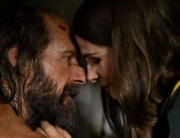Beneath the thin veneer of absurdism, Machete (Danny Trejo) slices through the ghastly realities of U.S./Mexican relations: politics, corporations, and cartels. The motto of the title character is “Justice and the law aren’t always the same thing”—a prescient resonance with Antigone. It’s explained that Machete is “Vengeance incarnate… That is why he cannot die.” The mythopoeic truth of this premise combines with absurdism to suspend the audiences’ disbelief, even if for a laugh, as Machete consistently outruns point-blank machine gun fire.
As Freud observed about the function of a joke, it only works in confrontation with the traumatic: in this case, the political realities of so-called governments and their intra-/interrelations. The absurdity of Machete’s all too literal immortality elevates his character into the myth-making dimension. Much more is at stake here than the basic Hollywood truism that the hero must survive regardless of realism until—of course—it is his proper time to die. The underlying truth here lies in the tragic-comic confrontation with the big Other. In Machete Kills, it’s a showdown with the corrupt military industrial complex (headed by Mel Gibson as Voz), where universal justice is exacted against Voz’s superhuman arsenal using little more than a machete. As a contemporary recasting of the story of David and Goliath, Machete is the literal stone.
The movie is not perfect. For example, there is no reason for the secret agent-turned-revolutionary (Michelle Rodriguez) to remain a government mercenary when Machete asks for the number of U.S./Mexican secret agents in Mexico by defaulting to: “That’s classified.” This is a letdown not only for Machete, but for the audience, who actually learns a lot about these political realities in watching this film. But such flaws are forgotten in the gratuitous blood bath of this captivating pulp fiction. As philosopher Walter Benjamin said, “Sometimes truth takes the form of a fiction.” In Machete Kills, the truth rises beyond false debates (e.g., Obama’s supposed non-citizenship) and through a simple question regarding the ethical and moral character of U.S. presidents: Can they be trusted? Machete Kills answers this question by placing a licentious Charlie Sheen in the oval office. The answer is “No.”
Sheen plays an unscrupulous politician who, in between cigarettes, whiskey drinking, and orgies, bribes Machete to do his dirty work. The U.S. government fronts the largest cartel of all, and Machete’s task is to prevent global annihilation—not in the name of any so-called government, but driven by a blind sense of justice.
Mel Gibson plays the arch-villain whose militia of super-soldier clones looks Israeli, and Lady Gaga is La Camaleón (in part), a character who shape-shifts apropos race, age, and sex. How can one resist this movie? Though Machete Kills is the sequel to Machete, the latter is not required viewing; the Machete saga is thus far developing episodically.
Machete Kills represents a kind of universal auto-correction whereby imbecility (corruption and evil) is cancelled out by idiocy (a blind justice so extreme that it sometimes takes the form of bloodthirsty rednecks). In the end, Truth prevails, voiding Evil. The pen may be mightier than the sword, but Machete is assuredly more powerful than the military industrial complex. Two cheers!







Leave A Comment